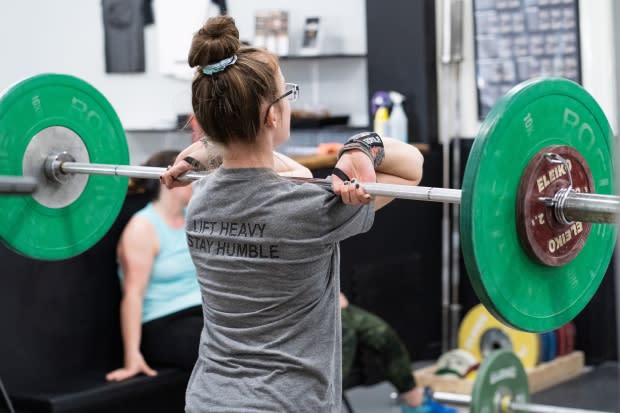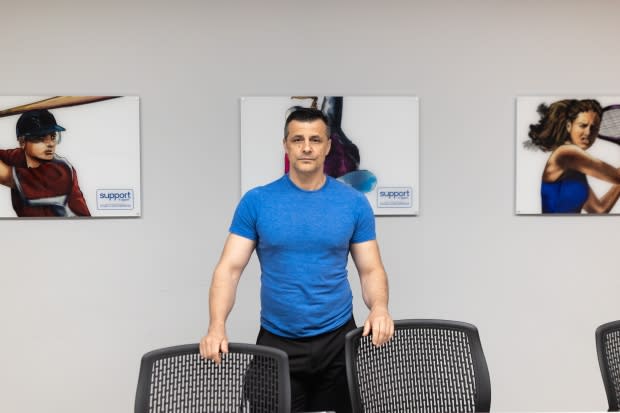Kindergym: Inside the world of competitive child weightlifting
It's 7 p.m. at the CrossFit Hubtown gym in Truro, N.S., and amid blaring music, Wesley Taylor is getting ready to work on his lifting technique.
"Chest up, knees bent," instructs Amanda Thompson, his lift coach. "Now, jump."
He does, lifting the steel barbell above his head.
"Good. Let's just try that one more time."
Taylor does another set and will get a few more lifts in before the night is over. He knows he's still got lots of room for improvement, but — even though he's only been weightlifting for about four years — he's pretty sure he's going to do it for the rest of his life.
Taylor is 10 years old.

Taylor trains in a discipline of weightlifting primarily consisting of the two official Olympic lifts: the clean and jerk, and the snatch.
Today, he's largely working without weights — focusing on technique with unweighted bars and light, youth-specific training equipment — but that's not how his days always go.
Taylor competed at the East Coast Games in Saint John, N.B., last month and was one of four entrants either still in middle school or who had only just graduated.
"For my snatch I lifted, I think it was 24 kilograms," Taylor said of his performance, then stopped himself, laughing. "No, that was my clean and jerk."

Taylor is a competitive child weightlifter and part of a growing trend. Though he and his teammate Maddy Webber, 14, are the only two to compete out of their gym, they're among many others across Canada and the U.S.
In the 2018-19 season, Canada had at least 63 Olympic-style weightlifters registered for competition between the ages of seven and 13, while the U.S. Weightlifting National Youth Championships had 437 competing in the same age range.
There are no official lower limits for age in the two countries. That's contributed to competitive weightlifting's increasing popularity as a youth sport, running counter to decades of warnings against children and adolescents lifting weights.

Those warnings are something Webber, who started lifting when she was 12, has experienced first-hand.
"Sometimes people think that I'm too young for it," Webber said. "But, whatever. It's a sport, like soccer or baseball."
Longstanding fears
Weightlifting is a niche sport in Canada, which is especially true in the Maritimes, said Nova Scotia Weightlifting Association board member Augie Westhaver.
It was the explosive growth of CrossFit in the last five or six years — which uses both the snatch and the clean and jerk in its regimen — that brought Olympic-style weightlifting out of the relative obscurity it had been in for decades, Westhaver said.
Many of those CrossFit athletes transitioned into Olympic-style weightlifting, legitimizing and growing the sport.

Though there are more in the sport than before, Westhaver said, fear keeps weightlifting as an afterthought when it comes to choosing a sport for kids.
"Right now, that low number reflects the newness of the sport regionally," Westhaver said. "But there's no reason to assume that it's any more or less risky than say soccer or rugby or football."
Most young competitive weightlifters are the children of Crossfitters, Westhaver said, as they are already familiar with it, and less afraid of potential injuries compared to more traditional sports like hockey, football and soccer.
"People who play those games are injured far more than they are with lifting a barbell above their heads," Westhaver said. "I think the anxiety is it's a novel sport, not many people see it. And it moves very fast."
These athletes can lift their heaviest weight, as long as ... there is some skill and technical approach to it - Karen Decker
Halifax pediatric physiotherapist Karen Decker agrees with him. Despite older studies that claimed young children shouldn't lift weights, she said most new studies show the sport is safe for all ages.
Some of that information is contained in studies that mostly found competitive weightlifting for youth results in fewer injuries than contact sports, and that most youth injuries are sustained by improper technique.
Child weightlifters are actually less likely than adults to be afflicted with strains, sprains or fractures when lifting, according to the British Journal of Sports Medicine.

However, not all publications support the sport.
In a 2011 study, the American Academy of Pediatrics stated they remain "hesitant to support participation by children who are skeletally immature" in competitive weightlifting due to a lack of research, while stating general strength training for children can be safe.
Despite this, Decker said the idea that skeletally-immature athletes shouldn't lift heavy weights has shifted in general.
"Taught correctly, progressed at a right level, these athletes can lift their heaviest weight, as long as ... there is some skill and technical approach to it," she said.
On the other side of the country, Montreal-based Brayan Ibanez is one of those fast-moving weightlifters. At only 12 years old and 105 pounds, Ibanez can already squat over 120 kilograms, snatch 65 kilograms, and clean and jerk more than 80 kilograms.
Along with a recent USA Youth National Championships gold medal — his second in as many years — Ibanez can be described as the strongest kid in North America.
He's trained partly by his father, Ciro Ibanez, a past Cuban national weightlifting champion, as well as a winner at the Pan American Games. He helps coach both Brayan and his sister, eight-year-old Emily, as well as a number of other children in his gym, the Canadian Crosslifting Federation. It's a number he expects will grow as the gym recently partnered with a Montreal school to develop weightlifting programs for local children.
While Ciro Ibanez believes people are used to young adults around 15 and 16 competitively weightlifting, they don't understand the work and training that's necessary prior to that age to get them there. Like gymnastics, which can begin as young as four or five years old, Ciro Ibanez said weightlifters can and should be training before their mid-teens.
"You can't wait until the age of 15 to be the champion," he said in a video call from Spain, where his son was competing in another weightlifting championship, just weeks after the U.S. event.
"You have to be the champion before, from the bottom."
MORE TOP STORIES


